Agritech innovators work together to deliver better solutions for farmers
Australian agritech leaders, Cibo Labs and Ceres Tag believe “collaboration is the key” in delivering integrated solutions for farmers that support a single decision-making framework and help drive on-farm agritech adoption.
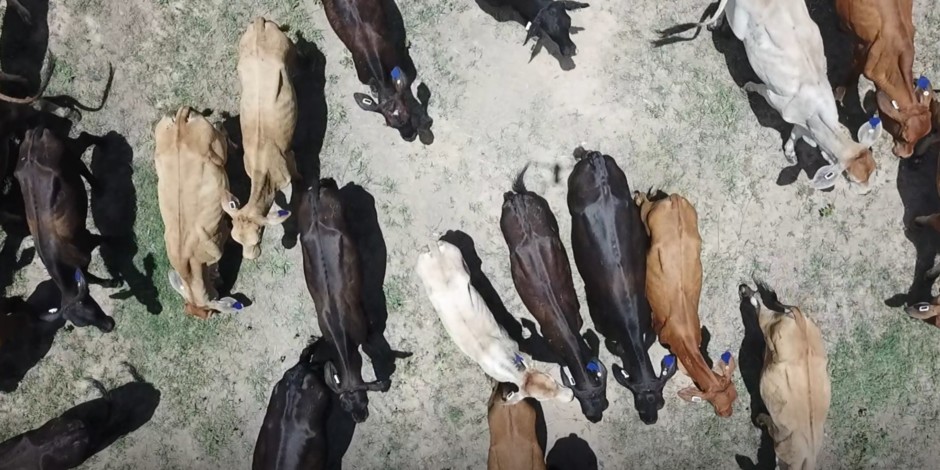
Having their booths located next to each other in the Ken Coombe Tech Yards at Beef Week Australia 2021 was a pivotal moment for Ceres Tag’s David Smith and Phil Tickle from CiboLabs – and revealed what an exciting space agritech has become.
“At the Beef 2018 expo David and I were among only a handful of agtech stalls, but this year [2021] there were a couple of pavilions full of tech companies and people were moving from one to the other,” said Phil.
“It’s tremendous to see that level of growth, and to see the amount of collaboration between those companies for the benefit of producers.”
The pair first met and worked together several years ago when David was developing an animal tracking platform and Phil was working at the Australia & New Zealand Cooperative Research Centre for Spatial Information (CRCSI).
Phil co-founded Cibo Labs in 2018, an agricultural data analytics company specialising in monitoring pasture productivity and land condition, and David chose Beef Australia 2021 to officially launch CeresTag, the world’s first direct-to-satellite animal tracking and data platform.
Both systems link with each other, to enable producers to monitor the health and location of their animals along with the amount of feed available in each paddock. By integrating the two systems the user can explicitly link the location and status of animals and the status of the landscape in near-real-time, and provide that information transparently through the supply chain.
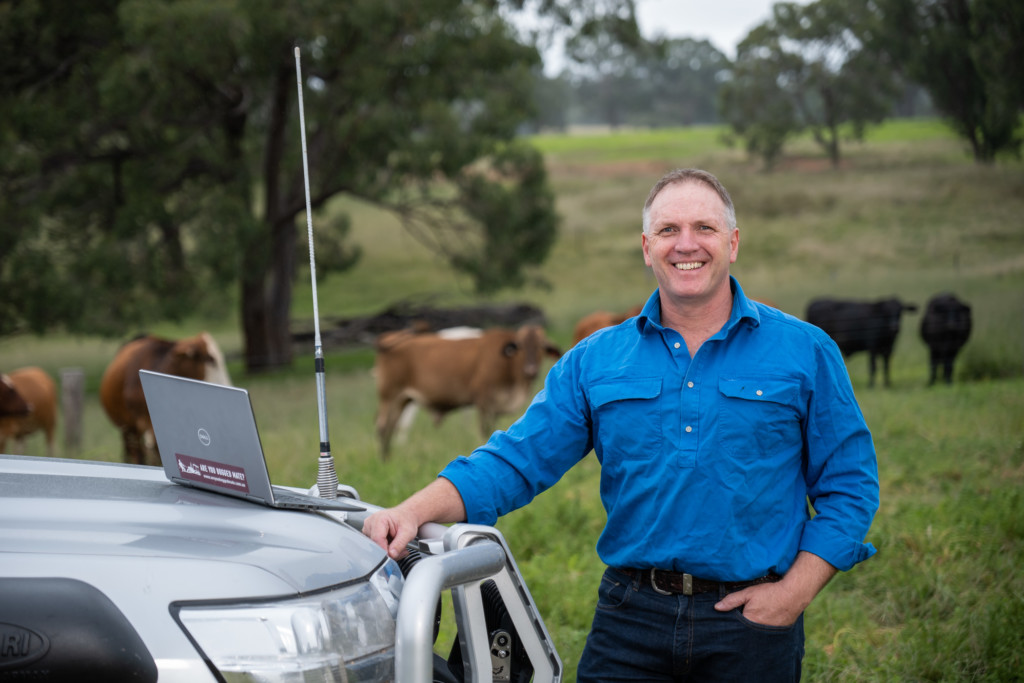
Cibo Labs’ PastureKey and MyFarmKey applications provide weekly paddock estimates of pasture biomass, and a unique digital farm record to enable current and future biosecurity, sustainability and supply chain accreditation and reporting systems.
“Collaboration is the key,” said Phil, to make the most of a major shift in the way that technology is being created and delivered to the end user.
“In the past there were a lot of barriers to entry for agtech providers, which basically meant if you weren’t a large company it was very difficult to develop these sorts of technologies, but now small and agile companies have the ability to drive applications through to an individual producer and engage them directly in on-going development,” explained Phil.
“We recognise that you can’t be an expert in everything, so individual companies with very specialist expertise are integrating their capabilities to provide those combined solutions, to make a far greater impact.”
Agritech interoperability essential for farmer usability
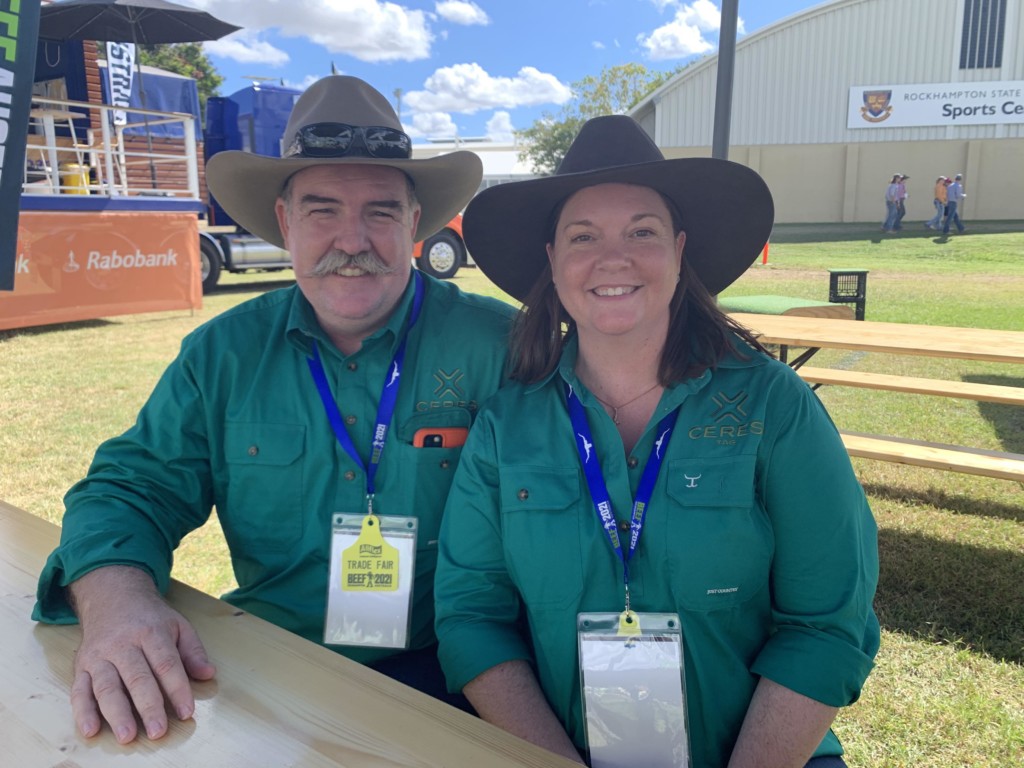
Ceres Tag Co-Founders, David and Melita Smith at Beef Week 2021, on the day of their global e-commerce launch.
David said collaboration was at the core of CeresTag’s development to ensure it could be used in tandem with other systems to enhance the producer’s existing ecosystem.
“We added on Bluetooth so it could talk to third party devices and, we also have APIs, [Application Programming Interfaces], so our data could feed into Cibo Labs and others to enable the systems to talk to each other and enhance what’s already on the property.”
Phil agrees.
“I think what’s happening now is convergence. Companies are talking to each other, we are sharing notes regularly, we’re referring people on to each other – that ecosystem is building quite rapidly to ensure that producers get to see that broad suite of capabilities across a number of applications and a number of companies.
“Quite a few of us have been around for three to five years now and we know each other and our technologies reasonably well and we’re not afraid to identify commercial opportunities, not just for ourselves but for the actual farmers by utilising the combination of technologies.”
RELATED: Simplicity and scalability, the key to Ceres Tag’s global approach
The integration of technology is essential, he said, but so is developing a relationship with the end user – the producer – amidst a rapidly evolving industry.
After just three years, CiboLabs is delivering over 50 million hectares of individual paddock level pasture biomass predictions every week, and in the coming months plans to have national fortnightly to monthly predictions of pasture biomass for every property in Australia.
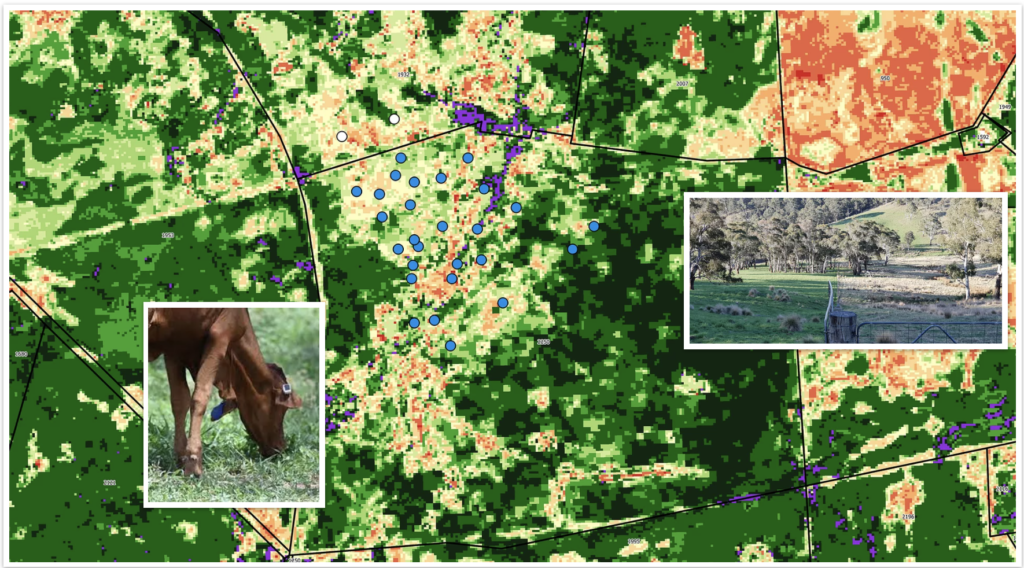
“Certainly from our perspective we’ve got great systems engineers, software developers and agricultural scientists in our team, using best practice software engineering and open standards. But just as importantly there’s relationships and trust,” said Phil.
“We’re ramping up from a technology perspective but in terms of growing the business and embedding that in everything from individual producers through to whole of industry applications, that’s really about looking at how we deliver our core services through a range of trusted channels.
“At the moment we’ve got everyone tripping over themselves to deliver a carbon app or a pasture app or a soils app or a biodiversity app. The ones that succeed will be the ones who bring that core information together to provide simple decision-making frameworks and dashboards for individual producers, so they can simply press a button and get reports or the information is passed through to a particular body.”
How to stay abreast of the rapid acceleration of agritech
Rapid advancements in agritech are also presenting a challenge in terms of encouraging producers to adopt new technologies on-farm.
Phil said technical support and extension is required to ensure that producers get maximum value out of these new capabilities. “Even as a science and technology company we’re seeing amazing changes in our abilities to tackle particular tasks and that change isn’t slowing down. With declining extension networks particularly in state agencies, it’s up to companies like ourselves to create a high level of awareness amongst producers via long term relationships.”
David is excited about the potential for the adoption of agritech among the new generations of farmers and agricultural workers.
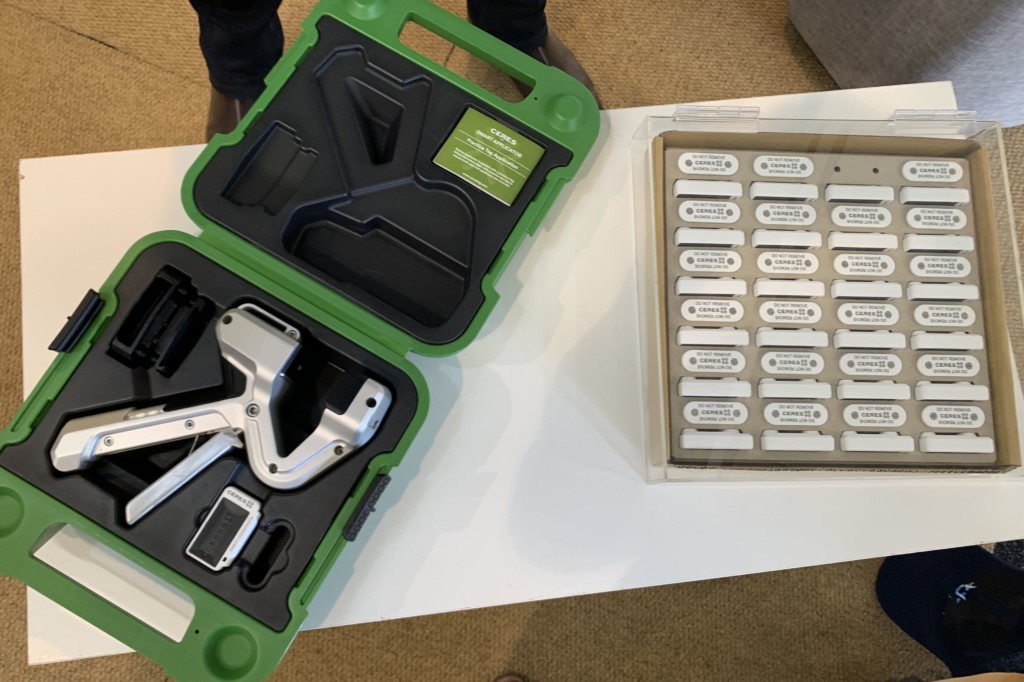
“Farmers are some of the smartest people around, they’ve been running businesses for generations and they know how to do all of this, they’ve just not necessarily had access to the tools that are now available in this space.
“What we really get excited about is that the next generation coming through are digital natives, they live and breathe this, so it’s not a big thing for them to adopt these technologies.”
One area that is lagging behind is universities, who have a crucial role to play in providing graduates with skills to navigate the agritech space, Phil said.
“We’ve got the private sector technology companies really roaring ahead in a lot of these spaces and we need to ensure those relationships between the universities, the research sector and the private sector are strong and collaborative, so that graduates with a degree in animal science or agronomy also have some skills in technology, and vice versa.
“At the moment it’s pretty rare to find individuals with a broad spread of that understanding across all of the technology suites and the animal science and the plant science. It’s a challenging and very complex space.”
National digital farm mapping needed to help integrate agritech
For Cibo Labs, the next goal will be the development of national standards based around farm mapping and property planning, that can provide a common platform for applications to build against and integrate with each other.
“Probably the biggest barrier to adoption in Australia for us, as an individual company developing our app, is the lack of a digital farm map. Most farms don’t have digital farm maps that are up-to-date, and they’re a prime piece of information that’s needed to allow us to integrate across technologies,” said Phil.
“We started that process with MyFarmKey which provides a unique authenticated digital farm record for the property boundary and the ownership of that property, but the next step is to develop a national mapping standard.”
Meanwhile, the next step for CeresTag is to expand into the live cattle export industry, wildlife and pets, David explained.
“We’re hoping to monitor wildlife and also solve some of the live export trade’s welfare issues because we can track the animal from the paddock to the port to the boat to the destination, and have continuity of traceability of the animal the whole way in an automated fashion.”
